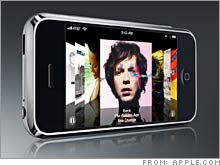How the iPhone will change computingThis is a computer, not a phone, says Fortune's David Kirkpatrick. Finally, we'll be able to surf the Web anywhere we want.(Fortune Magazine) -- Two weeks ago, I asked Steve Jobs if he was surprised by the growing frenzy about his upcoming iPhone. (I happened to be talking to him in a social situation.) He told me he wasn't really surprised that the device has captured the world's imagination, because even two years ago, which was one year into the project, he and his colleagues realized this was what a phone had to eventually become. He did concede that he didn't necessarily expect the world to get it so fast, however. As I wrote in January, I never before saw a technology announcement that immediately captured the imagination of everyone from my boss to my 14-year-old daughter -- both of whom immediately announced that they wanted an iPhone. And the much-noted frenzy has continued, culminating today in the phone's final release.  So are you worried about the extraordinary expectations for the phone, I asked Jobs? "Not really," he replied, "because it's actually even better than people expect!" That is an extravagant claim, but my reading of the early reviews from people like Walt Mossberg and David Pogue leads me to believe it isn't much overstated. But in the innumerable articles comparing the iPhone to existing phones from other suppliers, several fundamental points are being missed. For example, in an article in The New York Times last week a Nokia (Charts) executive was quoted saying, ludicrously, that the iPhone "is an evolution of the status quo." According to the article, "he said Nokia already sold high-end phones with a wide range of functions." Such statements make the speaker appear desperate, and ignorant. It is unconvincing to compare Apple's (Charts, Fortune 500) iPhone to the features of existing phones. Unlike pretty much everything else on the market, the iPhone is not a stand-alone device. It only makes sense to use in conjunction with a computer. You can't even activate it, for pete's sake, without going into iTunes on your PC or Mac. The iPhone's connection to the computer initially will, for most people, just enable them to synch their address book and phone numbers and put their iTunes music on the phone's built-in iPod. But longer-term there will be capabilities far beyond other phones. No other phone has such a tight connection to the user's computer. There may ultimately be few limits to what kinds of data and applications can be shared between the phone and the computer. Once that easy-to-synch connection exists, it can be exploited with great creativity. And that occasional tethering to the computer for a painlessly-easy update -- think of it, perhaps, as a digital fueling station -- is not the only way the iPhone differs from everything Nokia, Motorola (Charts, Fortune 500) and other old-school cellphone competitors have on the market. The iPhone is, as Mossberg pointed out "a true handheld computer." This is a radical statement. While Palm (Charts), Nokia, Research in Motion (Charts), and others have aspired to such a device, they have failed to deliver it. Yet it is what people want. The single biggest factor in this true-computerhood is the nature of the web browsing experience on the iPhone. When a web page appears, it is a true web page, easily manipulated by Apple's revolutionary user interface. You start by seeing the same web page you'd see on your computer, but in miniature form. Then you can easily blow up the portions you're interested in by tapping or doing the weird but cool finger-spreading motions which every other handheld device maker no doubt will immediately start trying to imitate. It is impossible to explain why the iPhone has so completely captured the world's imagination. But I think one major reason is that many of us who routinely use the web today instinctively feel we ought to be able to do so everywhere. Until now that has been impossible. The iPhone appears to be the kind of solution we have been waiting for. And the early built-in features, like Google (Charts, Fortune 500) maps with real-time traffic information demonstrate just what kinds of potential there is in real Internet features on a portable device. To hear Jobs talk, the iPhone is almost an extension of the Mac. I told him that as a Mac user I was concerned that the company's work on the iPhone would distract attention from the steady improvement of OS X, the Mac's operating system. To the contrary, he replied. Since the iPhone uses OS X as its fundamental software underpinning as well, its existence will in fact help OS X to evolve even faster, he said. I hope he proves right. So am I rushing out to buy an iPhone? No. Another thing Jobs is masterful at is the iterative improvement of Apple's products. I would rather wait to have the initial inevitable bugs ironed out and certain basic flaws corrected -- like the absence of a good speakerphone, silent vibration capability, and video recording. But, like half the audience at a tech panel I moderated last week who raised their hands when I polled them, I want an iPhone. |
Sponsors
| |||||||||||
